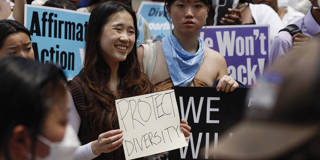By disallowing explicitly race-conscious admissions decisions by colleges and universities, the US Supreme Court at least has created an opportunity to think about more radical solutions to what is clearly a broken system. One especially worthy idea is to select deserving candidates by lottery.
BOSTON – The US Supreme Court’s decision disallowing explicitly race-conscious affirmative action in college admissions has intensified debates about privilege and social mobility in the United States. Elite colleges are central to these issues, and the disappointment felt among advocates of greater inclusivity and openness in higher education is understandable. But so, too, is the elation among Asian-Americans, who were discriminated against in the admissions process at institutions such as Harvard University.
In any case, we now have an opportunity to think about more radical solutions to what is clearly a broken admissions system at top US universities. The problems with the current approach are legion. For starters, the children of wealthy donors and alumni fill many coveted slots, and nobody bothers to deny that the motivation for such legacy admissions is to raise more money and add to top schools’ endowments.
Moreover, despite their need-based scholarships and stated commitments to inclusivity, elite colleges make only a limited contribution to social mobility when compared to less selective public universities and colleges. It is these institutions that provide the main pathway for upward mobility among whites and underrepresented minorities alike, owing to the simple fact that they admit far more Americans from less-advantaged socioeconomic backgrounds, who are unlikely to get into the most elite institutions.

BOSTON – The US Supreme Court’s decision disallowing explicitly race-conscious affirmative action in college admissions has intensified debates about privilege and social mobility in the United States. Elite colleges are central to these issues, and the disappointment felt among advocates of greater inclusivity and openness in higher education is understandable. But so, too, is the elation among Asian-Americans, who were discriminated against in the admissions process at institutions such as Harvard University.
In any case, we now have an opportunity to think about more radical solutions to what is clearly a broken admissions system at top US universities. The problems with the current approach are legion. For starters, the children of wealthy donors and alumni fill many coveted slots, and nobody bothers to deny that the motivation for such legacy admissions is to raise more money and add to top schools’ endowments.
Moreover, despite their need-based scholarships and stated commitments to inclusivity, elite colleges make only a limited contribution to social mobility when compared to less selective public universities and colleges. It is these institutions that provide the main pathway for upward mobility among whites and underrepresented minorities alike, owing to the simple fact that they admit far more Americans from less-advantaged socioeconomic backgrounds, who are unlikely to get into the most elite institutions.